2013年高中英语 Unit 3 Beijing 2008 SectionB同步精品课件 重庆大学版必修5
文档属性
| 名称 | 2013年高中英语 Unit 3 Beijing 2008 SectionB同步精品课件 重庆大学版必修5 |

|
|
| 格式 | zip | ||
| 文件大小 | 109.5KB | ||
| 资源类型 | 教案 | ||
| 版本资源 | 重庆大学版 | ||
| 科目 | 英语 | ||
| 更新时间 | 2013-12-09 00:00:00 | ||
图片预览

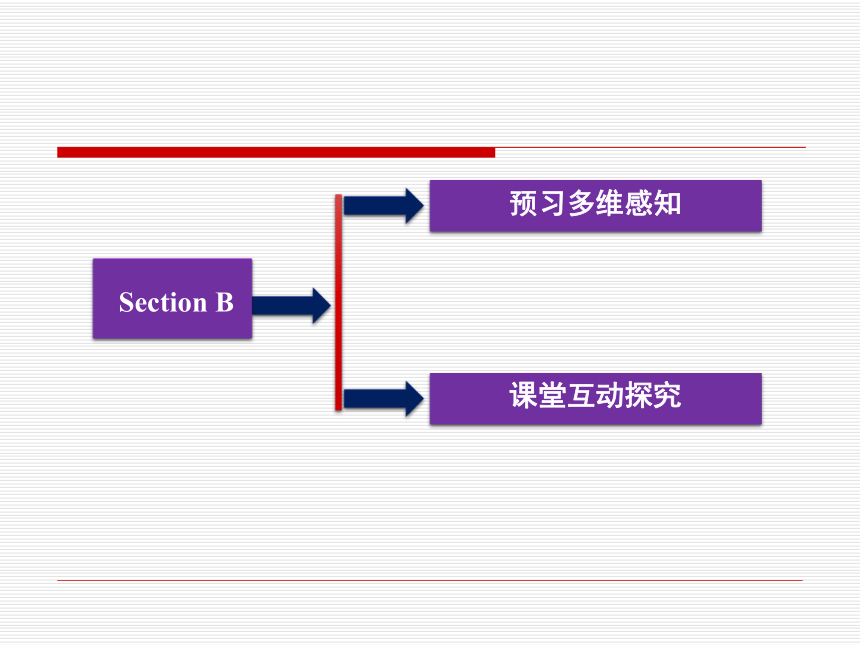
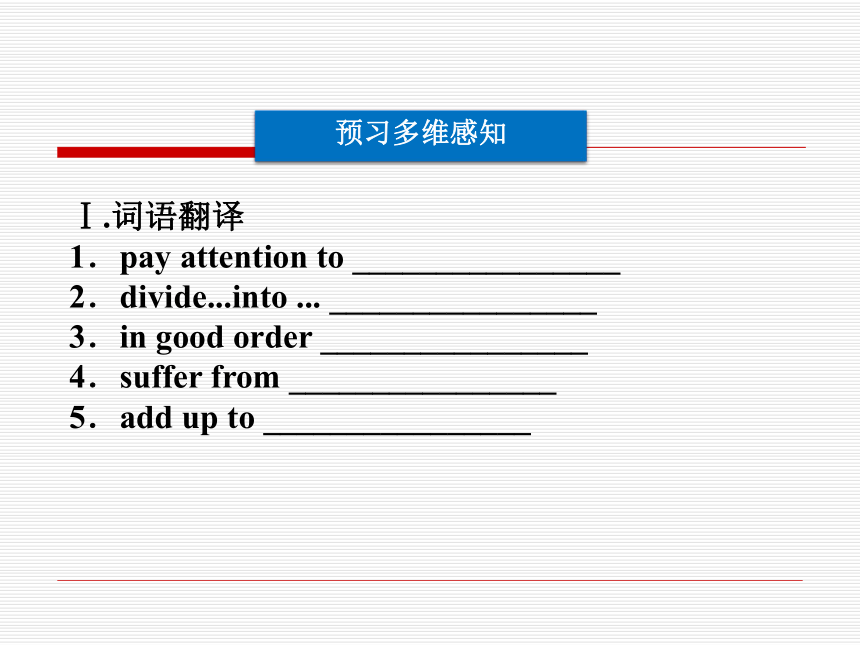
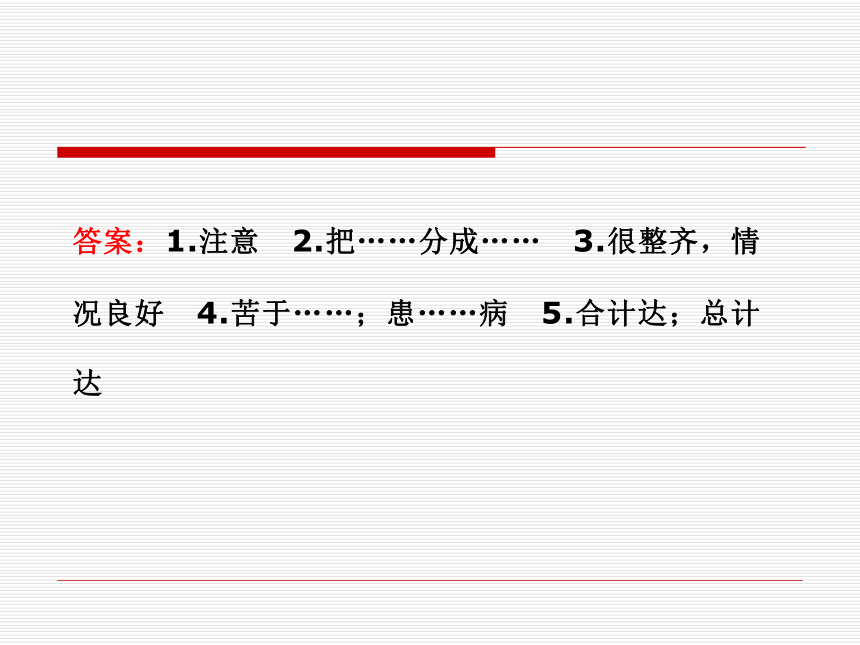
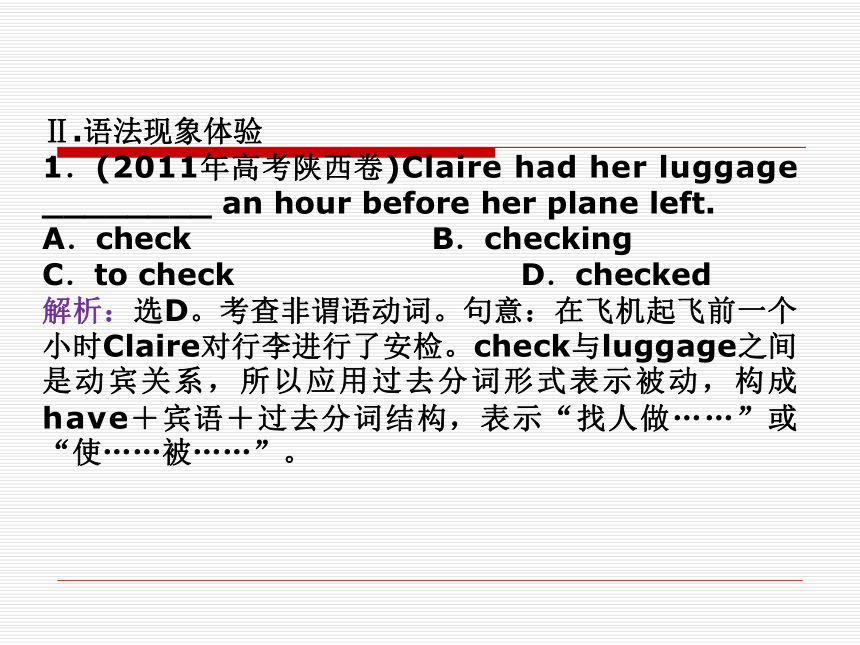

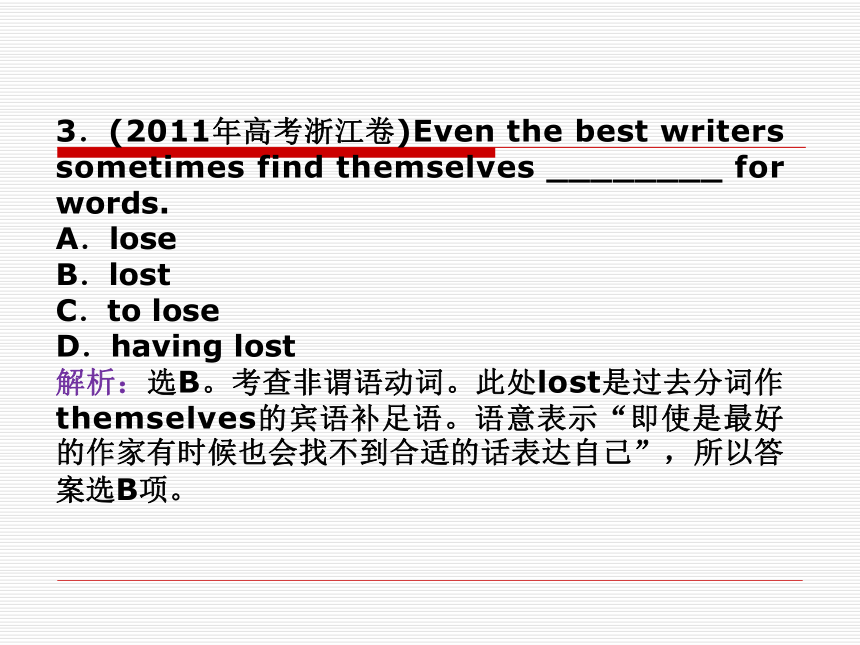

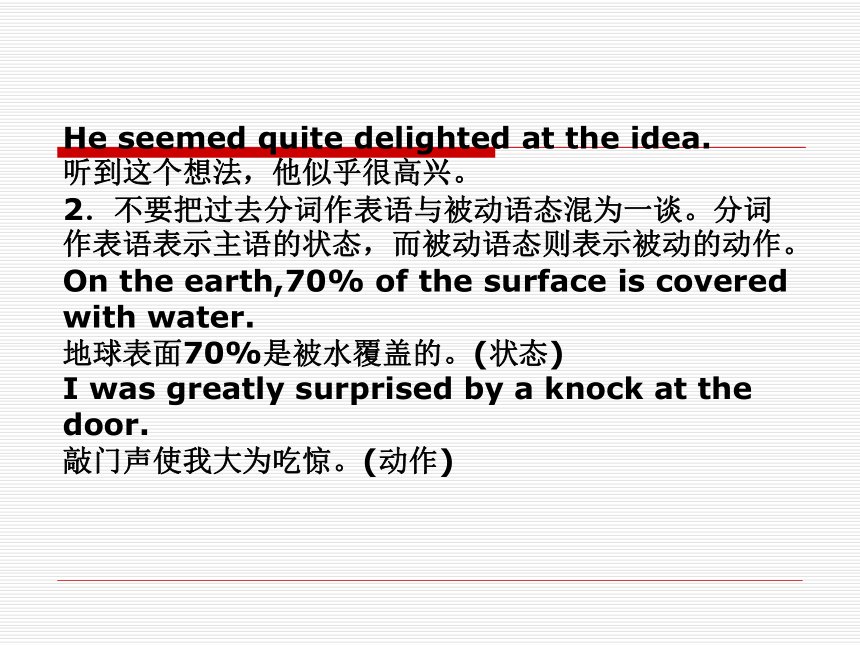
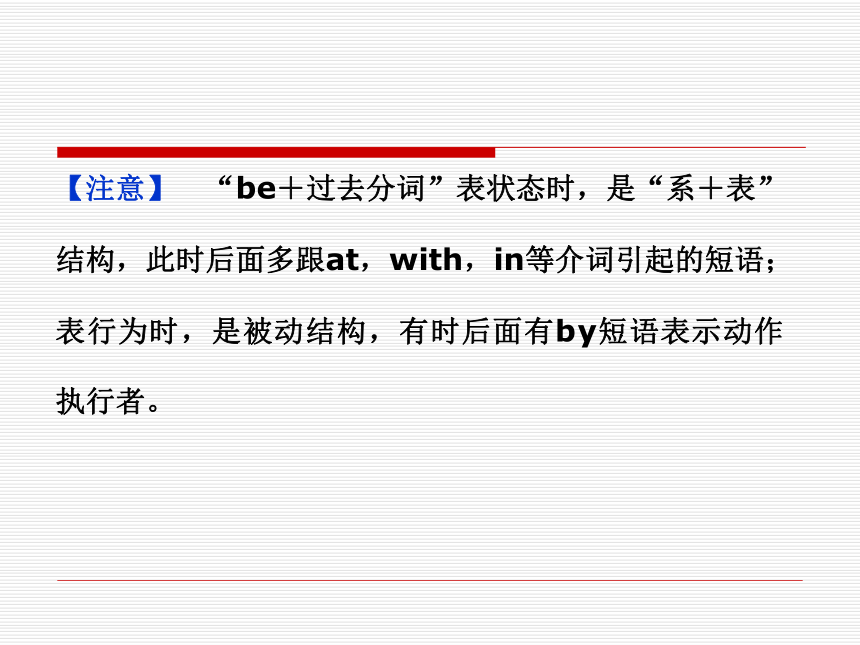
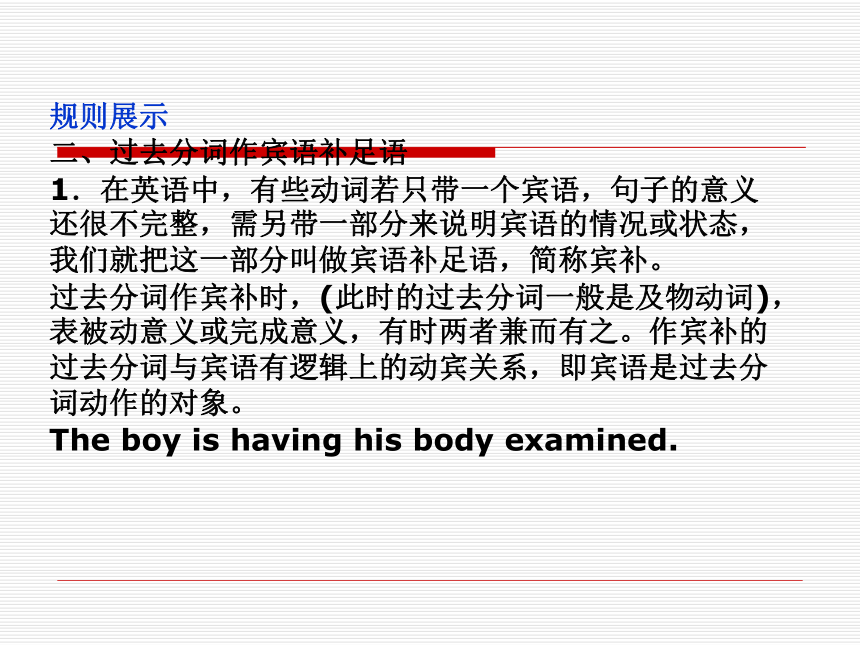
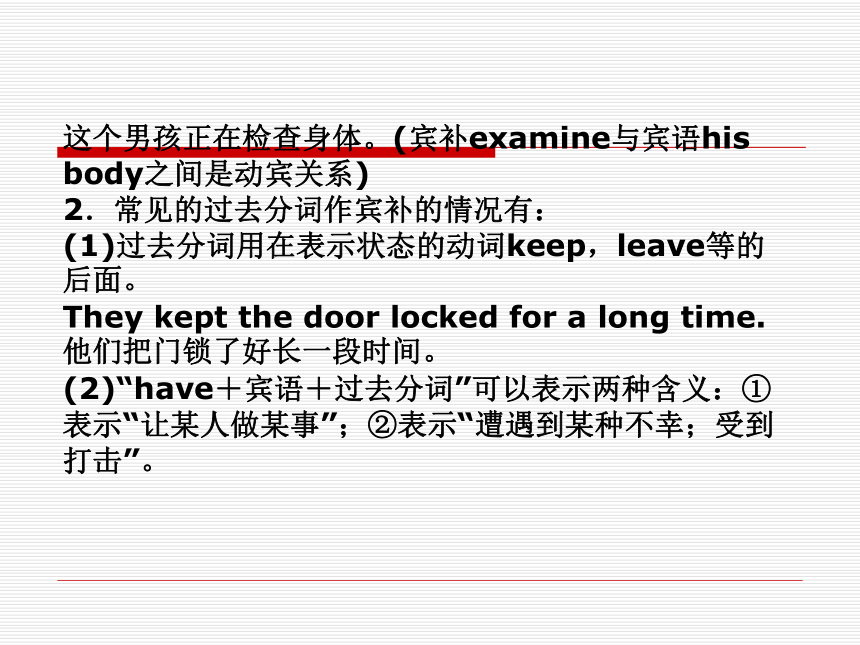
文档简介
课件34张PPT。Section B Language Focus课堂互动探究Unit 1预习多维感知 Section B预习多维感知Ⅰ.词语翻译
1.pay attention to ________________
2.divide...into ... ________________
3.in good order ________________
4.suffer from ________________
5.add up to ________________答案:1.注意 2.把……分成…… 3.很整齐,情况良好 4.苦于……;患……病 5.合计达;总计达Ⅱ.语法现象体验
1.(2011年高考陕西卷)Claire had her luggage ________ an hour before her plane left.
A.check B.checking
C.to check D.checked
解析:选D。考查非谓语动词。句意:在飞机起飞前一个小时Claire对行李进行了安检。check与luggage之间是动宾关系,所以应用过去分词形式表示被动,构成have+宾语+过去分词结构,表示“找人做……”或“使……被……”。2.(2011年高考重庆卷)Michael put up a picture of Yao Ming beside the bed to keep himself ________ of his own dreams.
A.reminding B.to remind
C.reminded D.remind
解析:选C。考查非谓语动词。句意:Michael把姚明的图片张贴在床边是为了提醒自己要实现自己的梦想。remind sb.of sth.表示“提醒某人某事”,himself与remind之间是动宾关系,故用动词的过去分词形式。3.(2011年高考浙江卷)Even the best writers sometimes find themselves ________ for words.
A.lose
B.lost
C.to lose
D.having lost
解析:选B。考查非谓语动词。此处lost是过去分词作themselves的宾语补足语。语意表示“即使是最好的作家有时候也会找不到合适的话表达自己”,所以答案选B项。课堂互动探究过去分词作表语和宾语补足语
规则展示
一、过去分词作表语
1.当“人”作主语时用过去分词作表语,表示主语的状态或思想感情等。
When we heard of it,we were deeply moved.
当我们听到这件事时,被深深地感动了。He seemed quite delighted at the idea.
听到这个想法,他似乎很高兴。
2.不要把过去分词作表语与被动语态混为一谈。分词作表语表示主语的状态,而被动语态则表示被动的动作。
On the earth,70% of the surface is covered with water.
地球表面70%是被水覆盖的。(状态)
I was greatly surprised by a knock at the door.
敲门声使我大为吃惊。(动作)【注意】 “be+过去分词”表状态时,是“系+表”结构,此时后面多跟at,with,in等介词引起的短语;表行为时,是被动结构,有时后面有by短语表示动作执行者。规则展示
二、过去分词作宾语补足语
1.在英语中,有些动词若只带一个宾语,句子的意义还很不完整,需另带一部分来说明宾语的情况或状态,我们就把这一部分叫做宾语补足语,简称宾补。
过去分词作宾补时,(此时的过去分词一般是及物动词),表被动意义或完成意义,有时两者兼而有之。作宾补的过去分词与宾语有逻辑上的动宾关系,即宾语是过去分词动作的对象。
The boy is having his body examined.这个男孩正在检查身体。(宾补examine与宾语his body之间是动宾关系)
2.常见的过去分词作宾补的情况有:
(1)过去分词用在表示状态的动词keep,leave等的后面。
They kept the door locked for a long time.
他们把门锁了好长一段时间。
(2)“have+宾语+过去分词”可以表示两种含义:①表示“让某人做某事”;②表示“遭遇到某种不幸;受到打击”。I must go to town to have my computer repaired.
我得进城找人修理我的电脑。
My elder sister had her wallet stolen on a bus last month.
上个月,我姐姐的钱包在公共汽车上被偷了。
(3)在“make+宾语+过去分词”这种结构中,过去分词的动作常表示结果。
I raised my voice to make myself heard.
我提高了嗓门以便被人家听到。(4)过去分词常用在感官动词watch,notice,see,hear,feel,find等的后面。
When we got to school,we saw the door locked.
当我们到学校时,我们看见门锁着。
(5)过去分词用在want,wish,like,expect,order等表示“希望,愿望,命令”这一类动词的后面作宾语补足语。
The teacher wouldn’t like the problem discussed at the moment.
老师不想此刻讨论这个问题。(6)过去分词用在“with+宾语+宾补”这一结构中,过去分词与宾语之间是动宾关系。
With many brightly-colored flowers planted around the building,his house looks like a beautiful garden.
由于周围种了许多色彩鲜艳的花,他的房子看上去就像一座漂亮的花园。规则运用
—Good morning.Can I help you?
—I’d like to have this package ________,madam.
A.be weighed
B.to be weighed
C.to weigh
D.weighed
解析:选D。have sth.done为固定用法,意思是“让某事被(别人)做”,其中过去分词作宾语补足语。规则展示
三、过去分词、不定式和现在分词作宾补时的区别
过去分词作宾补强调被动或完成,或者两者兼而有之;不定式作宾补强调动作发生的全过程;现在分词作宾补强调主动与正在进行。
I saw her taken out of the classroom.
我看见她被人从教室带了出来。(take与her是逻辑上的动宾关系,且“带出来”这一动作已经完成)I saw her come into the classroom.
我看见她进入教室了。(强调“进入”这一动作发生的全过程)
I saw her coming into the classroom.
我看见她正进入教室。(come与her是逻辑上的主谓关系,且“进入”这一动作正在发生)1.engaged
观察理解
1)Right now I’m engaged.
2)He is now engaged on his second novel.
3)She’s engaged to Peter.
4)I can’t get through-the line’s engaged.归纳拓展
be engaged in/on(doing)sth.忙于/从事(做)某事
get/be engaged to sb.与某人订婚
been engaged with sth.忙于某事现学现用
1)Tom ________ the girl that he ________ four years ago.
A.married;engaged
B.was married to;was engaged
C.has been married to;was engaged to
D.married with;was engaged in
解析:选C。句意:汤姆与四年前与之订婚的那个女孩结婚了。be married to与……结婚,表状态,可与现在完成时连用;be engaged to与……订婚。2.observe
观察理解
1)Do you observe Christmas?
2)Ben knew that someone had observed him meet Ryan.
3)Does everyone observe the speed limit in your country?
4)I observed that several students were asleep.归纳拓展
observe Christmas/May Day 庆祝圣诞节/五一劳动节
observe sb.do sth.看到某人做了某事
observe sb.doing sth.看到某人(正在)做某事
observe a rule/the law 遵守规则/法律
observe+that从句 注意到/观察……3.suffer from
观察理解
1)Many companies are suffering from a shortage of skilled staff.
2)He suffered from asthma.比较网站
suffer from,suffer
1)suffer from后接遭受战争、自然灾害等带来的苦难及患病之苦。
2)suffer作及物动词时,其宾语常为pain,loss,grief,insult,punishment,hardship,injustice,disappointment等表示精神痛苦的名词。现学现用
翻译填空
2)His company ________ a great loss due to the heavy rain.
由于大雨他的公司蒙受了巨大的损失。
3)He was absent from school today,because he is ________ a bad cold.
他今天没来上课,因为他患了重感冒。
答案:2)suffered 3)suffering from4. add up to
观察理解
①His illness added to the family’s trouble.
他生病了,这给他的家庭增添了麻烦。
②Add your scores up and we’ll see who won.
把你们的得分加起来,我们就可以看出谁赢了。
③These figures add up to fifty.
这些数字总计为50。归纳拓展
add...to... 把……加到……上
add to 增加;增添
add up sth./add sth.up 把……加起来;合计现学现用
4)—Would you like to drink some coffee with some sugar or milk?
—Oh,I’d like some milk ________ the coffee.
A.added on
B.added to
C.added up to
D.added up
解析:选B。add sth.to sth.意为“将某物加到某物中”,此处是将牛奶加入咖啡里,milk与add为逻辑上的被动关系。原句展示
Consult your dictionary if necessary.(page 40)
如有必要的话,查阅你的词典。句法简析
(1)if necessary意为“如有必要的话”,是if it is necessary的省略形式,常在句中作插入语,起补充说明的作用。if,when,while,once,whether,unless等引导的从句中如果含有be动词的某种形式,且从句的主语与主句主语一致或从句的主语是it时,从句的主语和be动词可以省略。
1)If necessary,we can pay in cash.
如有必要的话,我们可以付现金。2)He won’t come unless invited.
除非受到邀请,他才会来。
(2)if引导省略的情况还有下列几种:
if any 如果有的话
if possible 如果可能的话
if so 如果是这样的话
if ever 如果曾经有的话
if not 如果不这样的话现学现用
翻译填空
1)Send it by air mail ________________.
如果可能的话,用航空邮寄。
2)I might be away next week.____________,I won’t be able to see you.
下星期我可能外出。要是那样,我就见不到你了。
答案:1)if possible 2)If so单项填空
3)I don’t think they have any food left.________,lend them some.
A.If possible
B.If so
C.If not
D.If ever
解析:选B。句意为:我认为他们没有什么剩余的食物了。如果这样的话,借给他们一些。if so“如果是这样”,符合句意,故选B项。如把题干中的don’t去掉,并把any改为some,则选C项。
1.pay attention to ________________
2.divide...into ... ________________
3.in good order ________________
4.suffer from ________________
5.add up to ________________答案:1.注意 2.把……分成…… 3.很整齐,情况良好 4.苦于……;患……病 5.合计达;总计达Ⅱ.语法现象体验
1.(2011年高考陕西卷)Claire had her luggage ________ an hour before her plane left.
A.check B.checking
C.to check D.checked
解析:选D。考查非谓语动词。句意:在飞机起飞前一个小时Claire对行李进行了安检。check与luggage之间是动宾关系,所以应用过去分词形式表示被动,构成have+宾语+过去分词结构,表示“找人做……”或“使……被……”。2.(2011年高考重庆卷)Michael put up a picture of Yao Ming beside the bed to keep himself ________ of his own dreams.
A.reminding B.to remind
C.reminded D.remind
解析:选C。考查非谓语动词。句意:Michael把姚明的图片张贴在床边是为了提醒自己要实现自己的梦想。remind sb.of sth.表示“提醒某人某事”,himself与remind之间是动宾关系,故用动词的过去分词形式。3.(2011年高考浙江卷)Even the best writers sometimes find themselves ________ for words.
A.lose
B.lost
C.to lose
D.having lost
解析:选B。考查非谓语动词。此处lost是过去分词作themselves的宾语补足语。语意表示“即使是最好的作家有时候也会找不到合适的话表达自己”,所以答案选B项。课堂互动探究过去分词作表语和宾语补足语
规则展示
一、过去分词作表语
1.当“人”作主语时用过去分词作表语,表示主语的状态或思想感情等。
When we heard of it,we were deeply moved.
当我们听到这件事时,被深深地感动了。He seemed quite delighted at the idea.
听到这个想法,他似乎很高兴。
2.不要把过去分词作表语与被动语态混为一谈。分词作表语表示主语的状态,而被动语态则表示被动的动作。
On the earth,70% of the surface is covered with water.
地球表面70%是被水覆盖的。(状态)
I was greatly surprised by a knock at the door.
敲门声使我大为吃惊。(动作)【注意】 “be+过去分词”表状态时,是“系+表”结构,此时后面多跟at,with,in等介词引起的短语;表行为时,是被动结构,有时后面有by短语表示动作执行者。规则展示
二、过去分词作宾语补足语
1.在英语中,有些动词若只带一个宾语,句子的意义还很不完整,需另带一部分来说明宾语的情况或状态,我们就把这一部分叫做宾语补足语,简称宾补。
过去分词作宾补时,(此时的过去分词一般是及物动词),表被动意义或完成意义,有时两者兼而有之。作宾补的过去分词与宾语有逻辑上的动宾关系,即宾语是过去分词动作的对象。
The boy is having his body examined.这个男孩正在检查身体。(宾补examine与宾语his body之间是动宾关系)
2.常见的过去分词作宾补的情况有:
(1)过去分词用在表示状态的动词keep,leave等的后面。
They kept the door locked for a long time.
他们把门锁了好长一段时间。
(2)“have+宾语+过去分词”可以表示两种含义:①表示“让某人做某事”;②表示“遭遇到某种不幸;受到打击”。I must go to town to have my computer repaired.
我得进城找人修理我的电脑。
My elder sister had her wallet stolen on a bus last month.
上个月,我姐姐的钱包在公共汽车上被偷了。
(3)在“make+宾语+过去分词”这种结构中,过去分词的动作常表示结果。
I raised my voice to make myself heard.
我提高了嗓门以便被人家听到。(4)过去分词常用在感官动词watch,notice,see,hear,feel,find等的后面。
When we got to school,we saw the door locked.
当我们到学校时,我们看见门锁着。
(5)过去分词用在want,wish,like,expect,order等表示“希望,愿望,命令”这一类动词的后面作宾语补足语。
The teacher wouldn’t like the problem discussed at the moment.
老师不想此刻讨论这个问题。(6)过去分词用在“with+宾语+宾补”这一结构中,过去分词与宾语之间是动宾关系。
With many brightly-colored flowers planted around the building,his house looks like a beautiful garden.
由于周围种了许多色彩鲜艳的花,他的房子看上去就像一座漂亮的花园。规则运用
—Good morning.Can I help you?
—I’d like to have this package ________,madam.
A.be weighed
B.to be weighed
C.to weigh
D.weighed
解析:选D。have sth.done为固定用法,意思是“让某事被(别人)做”,其中过去分词作宾语补足语。规则展示
三、过去分词、不定式和现在分词作宾补时的区别
过去分词作宾补强调被动或完成,或者两者兼而有之;不定式作宾补强调动作发生的全过程;现在分词作宾补强调主动与正在进行。
I saw her taken out of the classroom.
我看见她被人从教室带了出来。(take与her是逻辑上的动宾关系,且“带出来”这一动作已经完成)I saw her come into the classroom.
我看见她进入教室了。(强调“进入”这一动作发生的全过程)
I saw her coming into the classroom.
我看见她正进入教室。(come与her是逻辑上的主谓关系,且“进入”这一动作正在发生)1.engaged
观察理解
1)Right now I’m engaged.
2)He is now engaged on his second novel.
3)She’s engaged to Peter.
4)I can’t get through-the line’s engaged.归纳拓展
be engaged in/on(doing)sth.忙于/从事(做)某事
get/be engaged to sb.与某人订婚
been engaged with sth.忙于某事现学现用
1)Tom ________ the girl that he ________ four years ago.
A.married;engaged
B.was married to;was engaged
C.has been married to;was engaged to
D.married with;was engaged in
解析:选C。句意:汤姆与四年前与之订婚的那个女孩结婚了。be married to与……结婚,表状态,可与现在完成时连用;be engaged to与……订婚。2.observe
观察理解
1)Do you observe Christmas?
2)Ben knew that someone had observed him meet Ryan.
3)Does everyone observe the speed limit in your country?
4)I observed that several students were asleep.归纳拓展
observe Christmas/May Day 庆祝圣诞节/五一劳动节
observe sb.do sth.看到某人做了某事
observe sb.doing sth.看到某人(正在)做某事
observe a rule/the law 遵守规则/法律
observe+that从句 注意到/观察……3.suffer from
观察理解
1)Many companies are suffering from a shortage of skilled staff.
2)He suffered from asthma.比较网站
suffer from,suffer
1)suffer from后接遭受战争、自然灾害等带来的苦难及患病之苦。
2)suffer作及物动词时,其宾语常为pain,loss,grief,insult,punishment,hardship,injustice,disappointment等表示精神痛苦的名词。现学现用
翻译填空
2)His company ________ a great loss due to the heavy rain.
由于大雨他的公司蒙受了巨大的损失。
3)He was absent from school today,because he is ________ a bad cold.
他今天没来上课,因为他患了重感冒。
答案:2)suffered 3)suffering from4. add up to
观察理解
①His illness added to the family’s trouble.
他生病了,这给他的家庭增添了麻烦。
②Add your scores up and we’ll see who won.
把你们的得分加起来,我们就可以看出谁赢了。
③These figures add up to fifty.
这些数字总计为50。归纳拓展
add...to... 把……加到……上
add to 增加;增添
add up sth./add sth.up 把……加起来;合计现学现用
4)—Would you like to drink some coffee with some sugar or milk?
—Oh,I’d like some milk ________ the coffee.
A.added on
B.added to
C.added up to
D.added up
解析:选B。add sth.to sth.意为“将某物加到某物中”,此处是将牛奶加入咖啡里,milk与add为逻辑上的被动关系。原句展示
Consult your dictionary if necessary.(page 40)
如有必要的话,查阅你的词典。句法简析
(1)if necessary意为“如有必要的话”,是if it is necessary的省略形式,常在句中作插入语,起补充说明的作用。if,when,while,once,whether,unless等引导的从句中如果含有be动词的某种形式,且从句的主语与主句主语一致或从句的主语是it时,从句的主语和be动词可以省略。
1)If necessary,we can pay in cash.
如有必要的话,我们可以付现金。2)He won’t come unless invited.
除非受到邀请,他才会来。
(2)if引导省略的情况还有下列几种:
if any 如果有的话
if possible 如果可能的话
if so 如果是这样的话
if ever 如果曾经有的话
if not 如果不这样的话现学现用
翻译填空
1)Send it by air mail ________________.
如果可能的话,用航空邮寄。
2)I might be away next week.____________,I won’t be able to see you.
下星期我可能外出。要是那样,我就见不到你了。
答案:1)if possible 2)If so单项填空
3)I don’t think they have any food left.________,lend them some.
A.If possible
B.If so
C.If not
D.If ever
解析:选B。句意为:我认为他们没有什么剩余的食物了。如果这样的话,借给他们一些。if so“如果是这样”,符合句意,故选B项。如把题干中的don’t去掉,并把any改为some,则选C项。
同课章节目录
- 5
- Unit 1 History of the Olympic Games
- Unit 2 Famous People in the Olympics
- Unit 3 Beijing 2008
- Unit 4 The Planet We Live on
- Unit 5 History and People
- Unit 6 Antarctica and the Environment
- Unit 7 The Internet and Our Life
- Unit 8 Magic Internet
- Unit 9 Computers and the Web
- 6
- Unit 1 The Coqui in Hawaii
- Unit 2 Troublesome Travelers
- Unit 3 Seeking Advice
- Unit 4 A Good Heart to Lean on
- Unit 5 I Have a Dream
- Unit 6 A Day’s Wait
